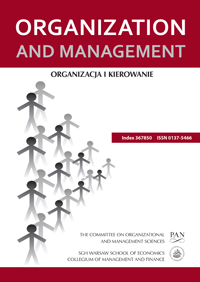Preface by Editor-in-Chief
prof. dr hab. Maciej Urbaniak
We have a great pleasure to pass the third issue of our magazine this year. The current issue is devoted to particularly important problems concerning human resource management.
In the first article Anna Rogozińska-Pawełczyk presented her reflections on significance of the psychological contract for the relationship between high effective human resource management systems and employee productivity. Based on the research, author has found that the high-effective human resource management systems (expressed by content, process and climate) affect employee productivity, both directly and indirectly – through the intermediary role of a psychological contract (expressed by the employer and employees through fulfilling mutual promises).
Agata Borowska-Pietrzak in her study points to determinants and conditions of the personnel function which shape a sense of professional satisfaction. Results of the empirical studies presented in this article indicate that the high-quality level of the modern personnel function determines the increase of the sense of professional satisfaction. Author also notices that sources of this satisfaction (subjective attributes) are quite diverse and do not depend directly on HRM quality in the organization.
Dariusz Turek tried to describe how and in what situations HRM practices may contribute to counterproductive behavior. Based on the cognitive framework of employee behavior in the organization, it was assumed that negatively perceived human resource management practices may indirectly affect the counterproductive behavior of employees. Author indicates, based on the results of empirical research,
the important role of human resource management practices in counteracting counterproductive behavior and building a professional climate. He also indicates the need for longitudinal research, which will better explain the nature of the impact of the HRM system on the activity of employees in the professional environment.
Marcin Wnuk in his article presented the result of the study in which he verified the mechanisms of the impact of perceived support received from the organization and supervisor, gratitude and organizational loyalty on the affective commitment of employees and the desire to leave it. Research results confirmed the existence of mechanisms of impact of perceived support received from the supervisors and perceived support received from the organization on the employee’s attitude towards the organization and the key role of gratitude and loyalty for shaping affective commitment.
In the last article, Katarzyna Januszkiewicz tried to describe the relationship between cognitive and behavioral aspects of the flexibility of organizational behavior of employees. In the course of interesting empirical analyzes, the author showed that there is a statistically significant relationship between the self-assessment of flexibility and the frequency of occurrence of a given behavior.
Enjoy your reading
Maciej Urbaniak
Published: 2019-11-19
